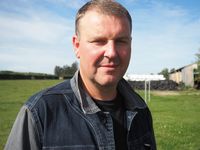EMB Newsletter September 2019
Newsletter as PDF
Contact
EMB - European Milk Board asbl
Rue de la Loi 155
B-1040 Bruxelles
Phone: +32 - 2808 - 1935
Fax: +32 - 2808 - 8265
Dear dairy farmers, dear interested parties,

2008/2009 - 2019!
More than ten years ago, dairy farmers organised major milk strikes, as part of their Europe-wide fight for fair milk prices. In 2008 and 2009, they courageously and, at the same time with a heavy heart, poured away the contents of their milk tanks to clearly show the whole world how they were being grossly underpaid for their milk. Now, in September 2019, I would like to invite everyone to celebrate these 10 and 11 years of milk strikes and to felicitate the courage and strength of the participating dairy farmers. Actions will be staged in France and Belgium, among other countries. That historic moment was a real turning point for us, where we spoke out loud and clear for the survival of our profession. These moments of fighting together with all of you are a point of great pride for me!
For more than ten years, our objective has always been to make it clear to everyone (i.e. farmers, policy-makers, citizens and farmers' organisations of every kind) that we need an effective instrument to regulate the production of agricultural products, including milk. And by we, I do not only mean farmers. We includes:
- Farmers, who should be able to make a decent living from their work. So that new farms are founded in all regions of Europe and family farms continue to be widespread, instead of farms becoming concentrated in a few regions alone;
- Citizens, who are also consumers. So that they can continue to have access to healthy, high-quality products that are produced in sufficient quantities in their regions, and that this is guaranteed for a long time in the future as well;
- Policy-makers, because they bear significant responsibility in ensuring the well-being of the citizens of Europe and the environment. A responsibility that, however, should be exercised in a way that does not infringe on the well-being of our fellow citizens in other parts of the world;
- Farmers' organisations, like the chambers of agriculture, associations, trade unions and cooperatives, who need to go back and take stock of their founding goals and main tasks!
For some years now, the EMB has been advocating for the implementation of the Market Responsibility Programme (MRP), which includes the important tool of voluntary production cuts. Commissioner Hogan's term of office is coming to an end and it was precisely these voluntary production cuts that resulted in clear relief in the dairy sector in 2016 and 2017. It was the only real positive decision taken by the outgoing Commissioner; this decision was, nonetheless, decisive. Voluntary production cuts showed that the EMB's demands can be implemented very quickly and easily, and that the positive effects are immediately felt on the market. I therefore call on whoever will be chosen to head Europe's agricultural sector as well as on the new European Commission and Parliament to establish and implement our MRP as soon as possible.
The approach adopted in the context of free trade agreements is also decisive for the agricultural sector. We have strongly criticised these agreements which go against farmers' interests. Producers, consumers and the environment need to be given much greater importance in these negotiations. Therefore, I call on our newly-elected representatives to engage in dialogue with us, in our countries as well as in Brussels, so that we can defend our interests, as well as those of consumers.
It has also been ten years since the launch of Fair Milk in Belgium – something that we look forward to celebrating in a fitting manner with our Belgian friends. The creation of Fair Milk in different European countries and, of course, the milk strikes – these singular, unforgettable events – have significantly contributed to the success of the EMB. We would like to thank everyone who has invested their time, energy and courage in our struggle!
Stand up, all dairy farmers!
I hope you enjoy reading our September newsletter.
Boris Gondouin, EMB Executive Committee member
Mercosur – The goalposts weren’t ‘moved’, they’ve been burned
Update from Germany
New US Farm Bill will offer farmers aid when milk prices fall under 350€ per ton
Heat waves and storms: How are they affecting Europe's dairy farmers?
Portrait: Veterinarians Without Borders Belgium
10 and 11 years of European milk delivery strikes
Invitation to European milk strike events in September
Impressum
European Milk Board asbl
Rue de la Loi 155
B-1040 Bruxelles
Phone: +32 2808 1935
Fax: +32 2808 8265
E-Mail: office@europeanmilkboard.org
Website: http://www.europeanmilkboard.org








